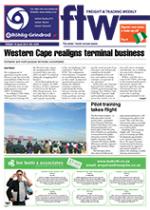The long-expected passing
of the baton is now a reality
– but what are the practical
implications of Nigeria’s
new status as the biggest
economy in Africa?
After rebasing its
gross domestic product
(GDP) data, the size of
the economy is estimated
by Bloomberg News to be
US$491billion for 2013
compared to South Africa’s
$370.3bn.
Nigerian GDP now
includes previously
uncounted industries like
telecoms, information
technology, music, online
sales, airlines, and film
production.
While the BBC quotes
Nigerian financial analyst
Bismarck Rewane as
saying: “The Nigerian
population is not better
off tomorrow because of
that announcement. It
doesn’t put more money
in the bank, more food in
their stomach. It changes
nothing.”
Is the same true from a
South African perspective?
“It doesn’t do anything
to our economy,” says
economist Mike Schüssler.
“If anything it makes the
African economy look more
successful in general and
that should help everybody.
“But diplomatically it’s a
bloody nose because if you
selected South Africa to be
part of BRICS because we
represent Africa would you
not have rather selected
Nigeria which has more
people and is the bigger
economy? And obviously if
you were to look at Security
Council seats, Nigeria now
has more of a stake than we
have.”
Liz Whitehouse of
Whitehouse and Associates
agrees that there will be no
practical implications, but
believes it should give us a
wake-up call. Companies
must be
engaged in
Nigeria. A
lot of them
are anxious
and nervous
but from our
perspective
we’ve
seen more
and more
companies
moving into
Nigeria and
making
strategic
decisions
in terms of
acquisitions.
“Premier
has gone
the acquisition route. They
have spent a lot of time
researching the market and
have gone in with Nigerian
companies.
“Shoprite is rolling out
even in the north of the
country where there’s
so much
unrest – and
achieving
success. It’s
a question of
adaptability
to market
conditions.
For
Woolworths
it was the
Woolworths
way of doing
things,
which didn’t
work, while
Shoprite is
making it
work using
a different
model,” said
Whitehouse.
Schüssler agrees that
more and more South
African companies will be
heading there at an even
faster rate. “As Shoprite
opens more stores, others
will follow. We’re also seeing
an increasing number of
queries from roadfreight
operators on how to
approach the market – do
they partner with someone
or go it alone.”
For South African
exporters Schüssler sees
enormous potential in the
food manufacturing sector,
which he believes holds
more promise that the
automotive industry.
“We could become the
food factory of Africa and
it’s an area in which the dti
should be placing bigger
focus.”
Logistics operators are
also making significant
moves. In February this
year Imperial Logistics
announced the acquisition
of a 53% interest in Eco
Health, a pharmaceutical
distributor in Nigeria, for
a cash consideration of
USD74 million.
Eco Health partners with
pharmaceutical companies
to distribute, sell and
market their products, and
has longstanding contracts
with leading multinational
principals.
According to Imperial
CEO Hubert Brody, in 2012
pharmaceutical expenditure
in Nigeria amounted to
US$951 million.
Logistics major DSV
has been involved in the
Nigerian market for many
years, opening its own office
in 2000. “Because of the
volume of business we do,
our own offices made sense
because a good agent is
extremely difficult to find,”
said chief executive officer
Warren Erfmann.
“Growth was dramatic in
the beginning but over the
past few years it’s been more
steady than dramatic.”
And nothing will change
as a result of their newfound
status, says Erfmann.
“It’s been the change
to the formula used to
calculate their GDP coupled
with South Africa’s slow
economic growth rate since
2008 that have allowed
them to catch up and
surpass us as the largest
economy on the continent.”
Erfmann believes
poor infrastructure and
corruption are the biggest
trade inhibitors. But
market conditions are no
more challenging that
they are in the likes of
Angola, says Whitehouse.
“Unfortunately Nigeria’s
reputation precedes it and
doing business there is not
easy. Identifying a partner
is difficult and the black
market presents its own set
of challenges,” she says. “But
once you have found the
right partner, there are big
opportunities.”
From a shipping point
of view rates are high
because there’s limited cargo
on the southbound route.
But that’s the challenge
for South Africa. “Instead
of looking at what we can
export we should be looking
at what we can buy from
Nigeria because until there
is regular two-way trade
shipping rates will continue
to be a problem,” says
Whitehouse.
Redressing the container
imbalance will however
not be easy, says Erfmann.
“There’s a lot of oil and gas
moving out of Nigeria –
and that doesn’t come in
containers. Unfortunately
there’s not a lot of general
cargo coming down to South
Africa so there will always
be a container imbalance.”
INSERT & CAPTION
It doesn’t do anything
to our economy but
it makes the African
economy look more
successful in general
and that should help
everybody.
– Mike Schüssler

